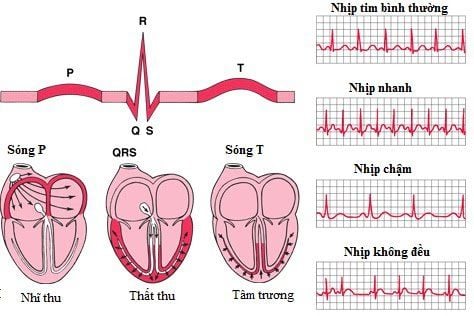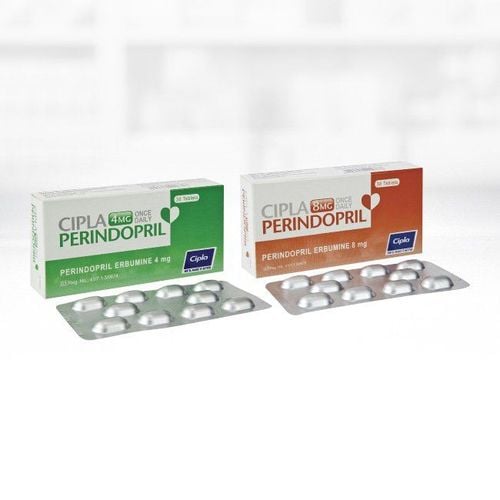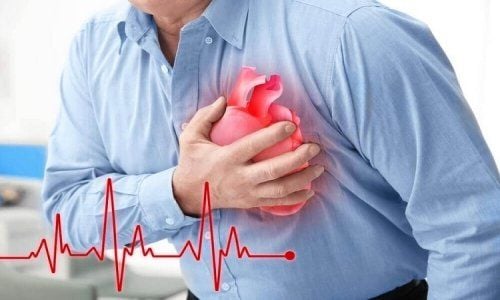This is an automatically translated article.
The article is professionally consulted by a Cardiologist.Heart failure, also known as congestive heart failure, occurs when the heart doesn't work to pump blood as well as it should, and blood becomes blocked in the blood vessels (congestion). A lot of people think that heart failure only happens to adults, but actually people of all ages are at risk for heart failure, including infants, children, and adolescents.
1. Causes of heart failure in children
Heart failure in children is often caused by congenital heart defects. In some cases, children also develop heart failure from infection or other health problems, including one of the following: Hypertrophic cardiomyopathy ; heart valve disease ; arrhythmia ; chronic lung disease; anemia ; viral infection; hypertension ; a lot of blood loss; hyperthyroidism ; complications after heart surgery ; side effects of drugs, especially chemotherapy drugs.Pediatric heart failure has many differences from adult heart failure in terms of causes and clinical symptoms. Timing of onset is key in diagnosing the cause of heart failure in children.
2. How does heart failure affect a child's development?
If heart failure affects the left side of the heart, it will be very difficult for the heart to transport blood around the body, causing blood to block in the pulmonary blood vessels, causing the lungs to become congested.When heart failure affects the right side, it is difficult for the heart to pump blood to the lungs, causing blood to clot in the liver and veins, causing the body to retain water.
Children with heart failure tend to grow slightly slower than healthy babies, and are also slightly shorter in height. This is especially true for children with congenital heart disease and congestive heart failure. Babies expend more energy, need extra nutrition and sometimes have difficulty absorbing food. Children with heart failure may take longer to reach certain life milestones, such as crawling, sitting up, or being proficient on the potty.

Trẻ bị suy tim thường có chiều cao thấp hơn trẻ bình thường.
3. Symptoms of heart failure in children
The symptoms outlined below are the most common symptoms of heart failure. However, each child will show different symptoms, including:Swelling of the legs, ankles, eyelids, face and sometimes even the abdomen. Unusually fast breathing. Shortness of breath or shortness of breath. Fatigue, nausea, loss of appetite. Drowsiness while eating or becomes too tired to eat. Unusual short-term weight gain, despite poor appetite (usually due to fluid retention in the body). Cough and congestion in the lungs. Sweat a lot while eating, playing, or exercising. Shortness of breath when performing routine activities, especially walking and climbing stairs. Reduced muscle mass. Slow weight growth, no weight gain. Changes in skin temperature and color (usually cold, wet or sweaty skin, hot flashes, etc.). The severity of symptoms depends on the extent to which the heart's pumping ability is affected. Symptoms of heart failure can be confused with other conditions. Always consult your doctor for diagnostic advice.
4. Diagnosis of heart failure in children
Your doctor will do a complete physical and medical history, asking questions about your appetite, breathing, and energy levels. Other diagnostic procedures include:Blood and urine tests. Straight chest radiograph: Uses X-rays to create images of internal tissues, bones, and organs on film. Electrocardiogram (ECG or EKG): A test that records the electrical activity of the heart, which can help diagnose arrhythmias and detect problems with the heart muscle.

Xét nghiệm ghi lại hoạt động điện của tim, có thể giúp chẩn đoán các rối loạn nhịp tim và phát hiện các vấn đề của cơ tim.
5. Treatment of heart failure in children
Treatment for heart failure will be determined by specialists based on factors: Age, general condition and medical history; severity of the disease; your baby's tolerance to specific medications, procedures, or therapies; expectations about the course of the disease; family choice.
If the cause of heart failure is a congenital heart defect or an acquired heart disease such as rheumatic heart disease, surgery is necessary. Medications or pacemakers are often helpful in the early stages of treatment. Medications may also be used after surgery to help improve heart function during recovery.
Medications and pacemakers commonly used to treat heart failure in children, which may include:
● Digoxin. This medication improves heart muscle contractions and helps the heart beat more evenly.
● Diuretics: Helps the kidneys remove excess water from the body.
● Potassium-sparing diuretics: Helps the body retain potassium, an important mineral and electrolyte that is often lost with diuretics. Angiotensin-converting enzyme inhibitors: Dilate blood vessels, making it easier for the heart to pump blood into the body.
● Beta-blockers: Reduces heart rate and blood pressure, helping the heart work more efficiently.
Heart failure prevention is the best way to detect heart failure in children early. Currently, Vinmec International General Hospital is implementing a HEART DISEASE PACKAGE, which is an effective measure to help you detect your condition early, from which doctors will advise on a treatment plan suitable for your health. friend.
Please dial HOTLINE for more information or register for an appointment HERE. Download MyVinmec app to make appointments faster and to manage your bookings easily.













